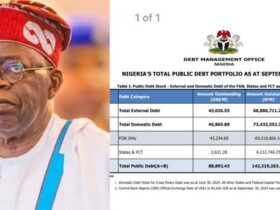
Richard Ugbah, a Nigerian citizen convicted of wire fraud in the United States, had his request for a sentence transfer to Nigeria rejected by the ECOWAS Court of Justice. The court declared on December 14, 2023, that it did not have the authority to approve his application.
Ugbah, who lives in the US, was found guilty of wire fraud by the District Court for the Western District of Wisconsin in February 2017. In November 2017, he admitted to another charge of conspiracy to commit fraud, resulting in a 12-year prison sentence.
After serving eight years, Ugbah sought to be transferred to Nigeria, citing his eligibility under the United Nations Office on Drugs and Crime Handbook on the International Transfer of Sentenced Persons. His case was heard by the court starting on May 2, 2023.
Ugbah, represented by lawyers Augustine Ezenwankwo and Kayode Fasetire, asked the ECOWAS Court to instruct the Federal Republic of Nigeria and the Federal Ministry of Justice to start the process for his transfer to Nigeria to complete his sentence. He maintained that such a transfer was permissible under international conventions and treaties against transnational crimes.
The Nigerian government, represented by Mrs. Maimuna Lami Shiru and two others, challenged Ugbah’s suit, questioning the court’s jurisdiction and the Ministry of Justice’s role in the case and calling for the dismissal of Ugbah’s claim.
READ ALSO: Why Tinubu’s Appointment As Petroleum Minister Is Illegal — Falana
However, on December 14, 2023, the court, represented by Judge Rapporteur Sengu Koroma and a three-member panel, agreed with the objection raised by the Federal Republic of Nigeria, the first respondent, and dismissed Ugbah’s claims as baseless and without legal foundation.
In its final decision, the ECOWAS Court agreed to remove the Ministry of Justice from the suit after both parties agreed. The court concluded that Ugbah did not provide a valid reason for his complaint against the respondent and that the court did not have the legal power to adjudicate the case, leading to the dismissal of the claim and the upholding of the respondent’s preliminary objection. #ECOWAS








Leave a Reply